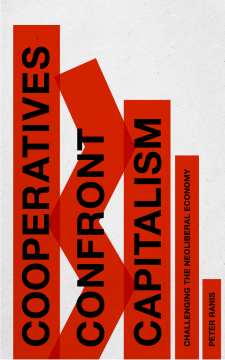
Additional Information
Book Details
Abstract
Cooperatives the world over are successfully developing alternative models of decision-making, employment and operation without the existence of managers, executives and hierarchies.
Through case studies spanning the US, Latin America and Europe, including valuable new work on the previously neglected cooperative movement in Cuba, Peter Ranis explores how cooperatives have evolved in response to the economic crisis. Going further yet, Ranis makes the novel argument that the constitutionally enshrined principle of 'eminent domain' can in fact be harnessed to create and defend worker cooperatives.
Combining the work of key radical theorists, including Marx, Gramsci and Luxemburg, with that of contemporary political economists, such as Block, Piketty and Stiglitz, Cooperatives Confront Capitalism provides what is perhaps the most far-reaching analysis yet of the ideas, achievements and wider historical context of the cooperative movement.
‘Provides a compelling overview of the potential for worker cooperatives to become a significant alternative to capitalist enterprises, and an innovative argument for the strategic use of eminent domain as a way of publicly supporting the expansion of a cooperative sector.’
Erik Olin Wright, author of Understanding Class
‘A comprehensive treatment of both the theory of worker-cooperatives and their recent history. It reflects many years of field research and fully incorporates the most recent literature. This book will be indispensable to ongoing discussions about Left strategy.’
Victor Wallis, managing editor of Socialism and Democracy
‘A refreshing reprise of the
significant accomplishments of worker cooperatives in Latin America over the last two decades. In the aftermath of the Occupy movement, Ranis provides a unique roadmap for students and scholars for the practical application of worker cooperatives today and in the years to come.’
Immanuel Ness, City University of New York
‘Offers a compelling case for worker cooperatives as antithesis and antidote to the neoliberal juggernaut. Without doubt, this is one of the best critical arguments in support of cooperatives and economic democracy I have recently read.’
Marcelo Vieta, University of Toronto
‘A valuable contribution to both the academic and political fields. Its direct and pleasant style, as well as its clarity and precision, not only makes it accessible but promotes a better understanding of the world we live in.’
Héctor Palomino, University of Buenos Aires
'A worthwhile read for anyone interested in understanding alternative, more egalitarian modes of production and employment.'
Peace News
'Cooperatives Confront Capitalism is an excellent anti-capitalist manifesto.'
Socialist Review'
'Provides a well-reasoned argument for cooperatives as a form that shatters the tired, self-serving shibboleths of capitalism.'
Counterpunch
Peter Ranis is professor emeritus in political science at the Graduate Center of the City University of New York. His current research interests include the uses of eminent domain on behalf of the working class and cooperative movements in the US, Argentina and Cuba. He has over eighty publications in various fields of social science in such journals as Monthly Review, Journal of Politics, Studies in Comparative International Development, Desarrollo Economico, Latin American Politics and Society, Labor Studies in Working Class History of the Americas, Socialism and Democracy, Canadian Journal of Development Studies, Current History, Working USA: The Journal of Labor and Society, Situations: Project of the Radical Imagination, Journal of Caribbean Studies, Civilisations, Polity, New Political Science and America-at-Work. He has published four books, among them Class, Democracy and Labor in Contemporary Argentina (1995) and Argentine Workers: Peronism and Contemporary Class Consciousness (1992).
Table of Contents
| Section Title | Page | Action | Price |
|---|---|---|---|
| Cover | Cover | ||
| About the author | i | ||
| Title page | iii | ||
| Copyright | iv | ||
| Dedication | v | ||
| Contents | vii | ||
| Acknowledgments | viii | ||
| 1. Why worker cooperatives? The historical underpinnings and defense of worker cooperatives | 1 | ||
| 2. The role of the state and the US social economy | 17 | ||
| In conclusion | 32 | ||
| 3. Worker cooperatives in the post-Occupy digital economy | 34 | ||
| The worker-ownership alternative | 39 | ||
| 4. Argentina’s cooperative challenges and breakthroughs | 45 | ||
| Introduction | 45 | ||
| The post-rebellion Argentine context | 48 | ||
| Argentine worker-recuperated enterprises confront the neoliberal system | 51 | ||
| Overcoming political and economic challenges to the formation of worker cooperatives | 58 | ||
| 5. Argentina’s leading edge | 63 | ||
| Argentine worker cooperatives: a growing phenomenon | 76 | ||
| In conclusion | 80 | ||
| 6. The proliferation and internationalization of the Argentine cooperative experience | 82 | ||
| Cooperatives, civil society and the state | 88 | ||
| In conclusion: prospects for Argentine cooperatives | 91 | ||
| 7. Eminent domain: confronting the loss of jobs in the United States | 94 | ||
| Eminent domain and the solidarity economy | 94 | ||
| 8. Building toward worker cooperatives by the use of eminent domain in the United States | 103 | ||
| Cooperatives and eminent domain as complementary organizations and processes | 103 | ||
| Using eminent domain | 107 | ||
| Why eminent domain? | 108 | ||
| In defense of the working class | 109 | ||
| Worker self-empowerment in the US: beyond factory occupations | 112 | ||
| Final comments | 116 | ||
| 9. Cuban cooperatives as a gateway to economic democracy | 118 | ||
| Conclusion | 136 | ||
| 10. Toward worker autonomy in the United States | 139 | ||
| In conclusion | 154 | ||
| References | 156 | ||
| Interviews | 165 | ||
| Index | 166 |
